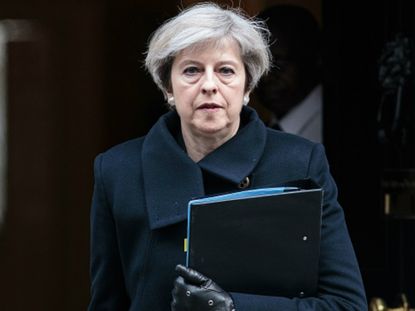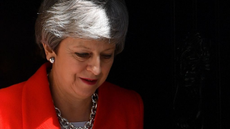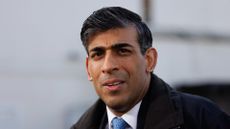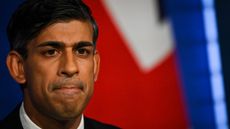The lady is for turning: Theresa May's U-turns
From dementia tax to staying in the EU, the Prime Minister has a history of going back on policies

Theresa May has denied she has made a U-turn by adding a cap to care costs on a poorly-received Conservative manifesto policy dubbed the "dementia tax".
However, this is not the first time the Prime Minister has been accused of backtracking on an unpopular policy.
"From opposing Brexit to hanging her Chancellor out to dry on proposed changes to National Insurance - May has built a reputation for acting in haste and repenting on national TV," writes the Daily Mirror.
Subscribe to The Week
Escape your echo chamber. Get the facts behind the news, plus analysis from multiple perspectives.

Sign up for The Week's Free Newsletters
From our morning news briefing to a weekly Good News Newsletter, get the best of The Week delivered directly to your inbox.
From our morning news briefing to a weekly Good News Newsletter, get the best of The Week delivered directly to your inbox.
Brexit
During the EU referendum campaign, May "was not a vocal Remainer but she was a firm one", says the Financial Times. Since becoming PM, however, she has pursued a harder course on Brexit than even many Leave voters envisioned, vowing to be a "bloody difficult woman", take the UK out of the single market and end freedom of movement.
National Insurance
In his first full Budget in March, Philip Hammond announced a rise in national insurance rates for the self-employed. The plan was jettisoned a week later after it was "panned as a White Van Tax by the press", says The Independent.
Workers on boards
Many commentators thought May's promise to force companies to include workers on their boards was an odd fit for a Conservative agenda - and they were right. After lobbying by businesses, it was downgraded to an optional measure.
Snap general election
"It isn't going to happen," was Downing Street's unambiguous response to early election rumours in March. Weeks later, the Prime Minister convened a surprise press conference to announce she was going to the polls.
Foreign worker lists
Home Secretary Amber Rudd suggested that employers might be forced to disclose the number of foreign workers on their payroll, provoking comparisons with North Korea and Nazi Germany. The spectacle of "commentators from across the political spectrum lining up to slate the policy" proved too much, LBC reports. Less than a week later, the government said it had no plans to enact such a policy.
Create an account with the same email registered to your subscription to unlock access.
Sign up for Today's Best Articles in your inbox
A free daily email with the biggest news stories of the day – and the best features from TheWeek.com
-
 Nigeria's worsening rate of maternal mortality
Nigeria's worsening rate of maternal mortalityUnder the radar Economic crisis is making hospitals unaffordable, with women increasingly not receiving the care they need
By Harriet Marsden, The Week UK Published
-
 'Elevating Earth Day into a national holiday is not radical — it's practical'
'Elevating Earth Day into a national holiday is not radical — it's practical'Instant Opinion Opinion, comment and editorials of the day
By Harold Maass, The Week US Published
-
 UAW scores historic win in South at VW plant
UAW scores historic win in South at VW plantSpeed Read Volkswagen workers in Tennessee have voted to join the United Auto Workers union
By Peter Weber, The Week US Published
-
 Will Aukus pact survive a second Trump presidency?
Will Aukus pact survive a second Trump presidency?Today's Big Question US, UK and Australia seek to expand 'game-changer' defence partnership ahead of Republican's possible return to White House
By Sorcha Bradley, The Week UK Published
-
 Farewell to Theresa May: a PM consumed by Brexit
Farewell to Theresa May: a PM consumed by BrexitTalking Point Maidenhead MP standing down at next general election
By The Week UK Published
-
 It's the economy, Sunak: has 'Rishession' halted Tory fightback?
It's the economy, Sunak: has 'Rishession' halted Tory fightback?Today's Big Question PM's pledge to deliver economic growth is 'in tatters' as stagnation and falling living standards threaten Tory election wipeout
By Harriet Marsden, The Week UK Published
-
 Why your local council may be going bust
Why your local council may be going bustThe Explainer Across England, local councils are suffering from grave financial problems
By The Week UK Published
-
 Rishi Sunak and the right-wing press: heading for divorce?
Rishi Sunak and the right-wing press: heading for divorce?Talking Point The Telegraph launches 'assault' on PM just as many Tory MPs are contemplating losing their seats
By Keumars Afifi-Sabet, The Week UK Published
-
 How would a second Trump presidency affect Britain?
How would a second Trump presidency affect Britain?Today's Big Question Re-election of Republican frontrunner could threaten UK security, warns former head of secret service
By Harriet Marsden, The Week UK Published
-
 'Rwanda plan is less a deterrent and more a bluff'
'Rwanda plan is less a deterrent and more a bluff'Instant Opinion Opinion, comment and editorials of the day
By The Week UK Published
-
 How the biggest election year in history might play out
How the biggest election year in history might play outThe Explainer Votes in world's biggest democracies, as well as its most 'despotic' and 'stressed' countries, face threats of violence and suppression
By Harriet Marsden, The Week UK Published